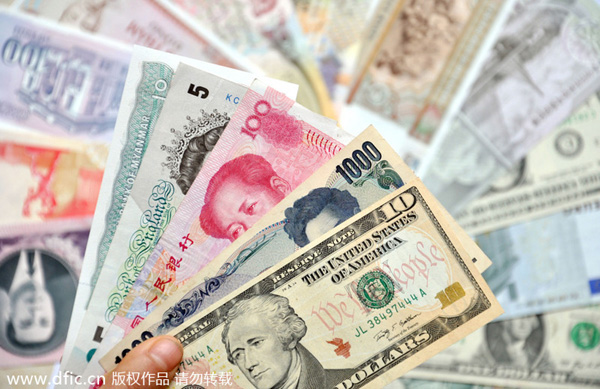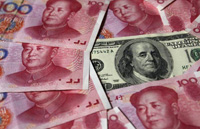China expands cross-border FX payment system
By Jiang Xueqing and Meng Jing (China Daily) Updated: 2015-01-31 09:31
 |
|
Foreign currencies are placed next to 100 yuan banknote. [Photo/IC] |
A pilot program for cross-border foreign exchange payments will be expanded to support the development of cross-border e-commerce and limit the risks associated with online payments involving foreign currencies, the State Administration of Foreign Exchange announced on Thursday.
The SAFE said it would allow qualified third-party payment institutions to join a pilot program to provide centralized receipt and payment services of foreign exchange and the associated buying and selling services.
The transactions must relate to online payments for cross-border e-commerce.
Previously, a transaction for a single shipment could not exceed the equivalent of $10,000. The limit for a single transaction related to overseas education, airline tickets and hotels was $50,000 or the equivalent.
The cap for a single shipment has been raised to $50,000, the same as for education and travel.
To join the pilot program, payment institutions must register as foreign exchange receipt and payment companies at a local SAFE bureau. They must also verify the authenticity of each transaction, maintain records for five years and report relevant business information and statistics to the regulator promptly.
E-commerce transactions hit 8.6 trillion yuan ($1.38 trillion) during the first three quarters of 2014, according to the Ministry of Commerce.
The full-year figure is expected to exceed 12 trillion yuan, which would be up 20 percent. Online retail transactions for the year are expected to exceed 2.7 trillion yuan, up 40 percent.
As cross-border e-commerce booms, it needs more support including payment and settlement.
Since September 2013, the SAFE has given approval for 22 third-party payment institutions such as Alipay, the online payment arm of Alibaba Group Holding Ltd, to conduct cross-border foreign exchange payment business in five cities including Beijing, Shanghai and Shenzhen.
Du Peng, chief of the current account department of the SAFE, told a news briefing on June 30 that the foreign exchange regulator may expand the pilot program in terms of regional coverage, payment institutions and the amount of a single transaction.
Wang Weidong, an analyst with Beijing-based iResearch, said the new regulation will boost the growth of cross-border e-commerce in China by getting more payment organizations involved.
"For consumers who want to shop abroad, it is important to have a credit card that can pay in US dollars. However, not every Chinese person has a credit card. The new regulation is expected to make it possible for online buyers to make cross-border payments in various ways, be it debit cards or Alipay," Wang said.
He added that the rise in the ceiling per shipment from $10,000 to $50,000 will be welcomed by cross-border shopaholics.
Wang Xiaoxing, an e-commerce analyst at Analysys International, expressed doubt that ordinary consumers can spend that much online, but he said the regulation will encourage more small and medium-sized enterprises to engage in cross-border e-commerce.
"At present, the majority of SMEs only use online platforms to find potential business partners. The actual payments are mostly done via traditional banks due to the lack of trust in each other.
"With the establishment of a credit system, the regulation will prompt more companies to pay online," he said.
- China urges new Greek leaders to honor COSCO Piraeus contract
- Chinese smartphone makers rise to rival Samsung, Apple
- More than 1,800 foreign dairy producer approved in China
- China punishes 11 fund companies for market malpractice
- China blocks 3,503 batches of substandard food imports in 2014
- Alibaba case underlines govt resolution to curb fakes
- UAV used to inspect electricity line
- China Minsheng Investment 'will help companies go global'

















